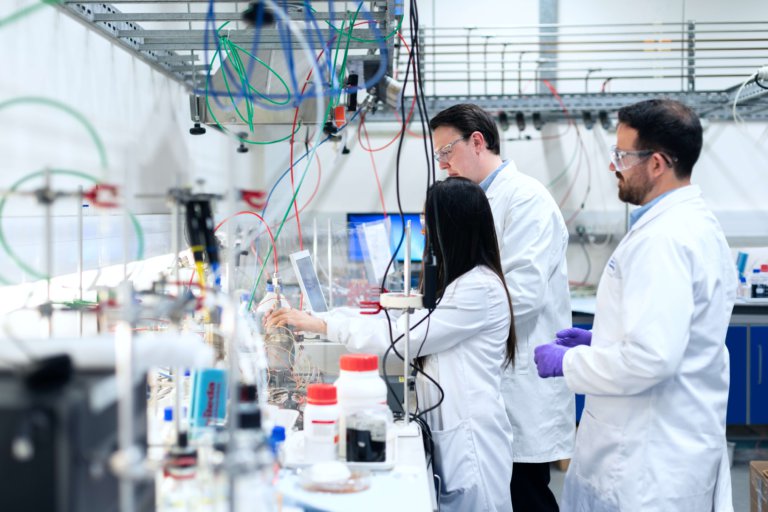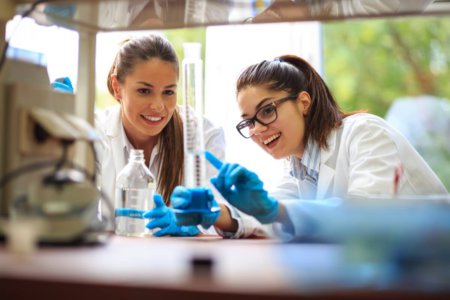
Crispr-Cas9 is a method to edit genes by cutting DNA and then letting natural DNA repair processes take over. It’s touted as a way to “rewrite the code of life.”
In lithium-ion batteries, lithium ions move from the negative electrode to the positive electrode during discharge and back when charging. That smartphone or laptop you’re reading from? That, and electric cars and lifesaving medical devices like cardiac defibrillators, are powered by this lightweight and rechargeable invention.
Enzymes are manufacturing everything from pharmaceuticals to biofuels. Antibodies, evolved using a method called phage display, are fighting autoimmune diseases. In some cases, they are curing metastatic cancer — in other words, they are taking control of evolution.
The above are the inventions and discoveries that won the Nobel Prize in Chemistry in the last three years. Yet, they represent only a minute sampling of the roles chemistry plays in almost every action on earth and in every object we touch.
As the awards show, it’s a field that’s exciting, fulfilling and conferring the greatest benefits to humankind. Several North American universities offer reputable PhD programmes to get you a headstart in this field. Here are four worth considering.
Michigan State University – Department of Chemistry

Michigan State University
One of the US’s top PhD in Chemistry programmes is located in a beautiful 5,200+ acre campus in the greater Lansing area of Michigan. Michigan State University’s Graduate Programme in Chemistry is home to a graduate student body of 200 students and holds annual research support in excess of US$9 million.
“A graduate education in chemistry is focused on an original research project that you will perform under the direction of our faculty,” explains Professor of Chemistry and Chair Robert E. Maleczka, Jr. “Our goal is to educate the next generation of scientists and to do everything possible to support students as they work toward their degrees and to prepare students for their independent careers in industry or academics.”
You will start by interviewing faculty and selecting a Research Advisor in the first semester so that you can begin your dissertation project by the second semester. The diverse research interests of the faculty here fall into a matrix of different aspects of traditional areas of Chemistry: Analytical, Physical, Organic and Inorganic. Specific interests range from “Ultrafast Spectroscopy: Photosynthesis and Nanomaterials” to “Nuclear Chemistry” and “Evidence-based Approaches to Improving Chemistry Education.” You will also be required to give two seminars, one in your second year and another before graduating.
Support is provided at every point of your MSU journey. Two types of financial support are typically available: Teaching Assistantships and Research Assistantships. Career assistance is just as outstanding. This includes updated daily information about academic, governmental and industrial positions and postdoctoral fellowships; individual advising; as well as workshops on job-seeking strategies, résumé writing and interviewing.
These offerings make the MSU Department of Chemistry a stepping stone to a successful career. Many leading companies, including Dow, DuPont and Pfizer actively recruit PhDs from this programme, and alumni can be found at Dow, DuPont, BASF, ExxonMobil R&D, Hewlett Packard, Procter & Gamble, NASA Jet Propulsion Laboratory, United States Food and Drug Administration and Federal Bureau of Investigation, amongst many others.
University of Oregon

The University of Oregon’s Department of Chemistry and Biochemistry is located in the city of Eugene. Source: University of Oregon Facebook
The UO Department of Chemistry and Biochemistry may be medium in size but its research in the traditional areas of biochemistry, inorganic, organic, and physical chemistry has earned it a reputation as a leading innovator. They set the foundation for new discoveries in materials science, molecular biology, optics, and theoretical chemistry.
As UO sees the importance of diversity and breadth in graduate education, its PhD takes a multidisciplinary approach. Here, researchers from different departments often collaborate and cooperate. You will have access to institutes and centres that facilitate scientific investigation at the boundaries of traditional fields, such as the Institute of Molecular Biology, the Institute of Fundamental Science, the Materials Science Institute, the Oregon Center for Optical, Molecular and Quantum Science.
You can also choose to complete thesis projects under the guidance of faculty in other departments, such as biology or physics. The result? Opportunities distinctive to UO in defining and solving scientific problems
Oregon’s science complex, plus state-of-the-art buildings and facilities, ensure PhD candidates have all the tools at their disposal to push the frontiers of science. There is a diverse array of modern research instrumentation, with highly-skilled, full-time instrumentation specialists available to assist with training and in the optimisation of experiments. Add a science library, nationally recognised computer resources, and professionally staffed technical support shops — all within close proximity of each other — and you’re set for a stimulating PhD journey at UO.
Other highlights of the UO PhD programme include one-on-one faculty-student interactions, mechanisms for critical feedback and support, as well as opportunities to present their research findings to a general audience. On weekends, the beauty of Oregon and the urban offerings of Eugene (one of the best places anywhere to live) beckon.
McGill University
In 1910, the first McGill PhD in Chemistry was awarded to Annie MacLeod. Since then, nearly 1,500 PhD’s have been earned in the long and impressive history of McGill’s Department of Chemistry.
“Many benchmarks in chemistry have McGill origins including Soddy’s research on the transmutation of the elements, Belleau’s discovery of the antiviral 3TC, and Ogilvie’s co-development of the first ‘gene machine’,” says Professor and Chair Dima Perepichka. Faculty members are active in areas of Materials, Chemical Synthesis, Bio-organic Chemistry, Biophysical Chemistry and Nanochemistry in addition to the disciplinary areas of Analytical, Physical, Inorganic and Organic chemistry.
These awards are borne on the back of a culture of support distinctive to this department. Here, 39 professors, and over 150 graduate students and 40 postdoctoral fellows work and build meaningful bonds together.
As you work towards a PhD in Chemistry at McGill, you will partner with faculty and students who come from all parts of the world. Off-campus, the surroundings are just as dynamic. McGill is located in Montreal, and though it does get zero-degrees-Fahrenheit cold, Quebec’s biggest city has street festivals, outdoor performances, and pop-up markets set on cobblestone streets and French architecture that will warm your heart.
University of Georgia

At UGA, you’ll have the privilege of working under the tutelage of scientists elected to the National Academy of Sciences. Source: University of Georgia Facebook
UGA Foundation Professor Dr. Gregory Robinson’s recent election to the National Academy of Sciences — one of the highest honours a scientist can earn — is a reflection of the spectacular science that has come out of his laboratory, as well as of the Department of Chemistry. Together with his team in the field of Organometallic Chemistry, Robinson advanced fundamental understanding of the structure, bonding and reactivity of elements such as aluminum, silicon, phosphorus and sulfur. It paves the way for their replacement of less abundant and more expensive elements.
“Regarding my election to the NAS, such accolades are always team efforts, and I have been fortunate to have worked with some exceptional co-workers, most prominently Dr. Yuzhong Wang, senior research scientist, here at UGA,” he said. “Moreover, my research programme has always been greatly supported by the senior administration of the University of Georgia.”
UGA PhD candidates have the privilege of working under the tutelage of greats like Robinson and Wang. As Graduate Teaching Assistants, you will not be mere hired technicians. Instead, you will play an active role, collaborating with faculty supervisors. This includes providing input into policy decisions. Similarly, as Graduate Research Assistants, you will be wholly participating in, and taking responsibility for, the direction of your dissertation research project. Your research mentors will provide broad access to multidisciplinary research skills as well as in-depth understanding of a targeted research project.
Both roles ensure PhD candidates at UGA have a voice in the educational decision-making process. It’s bound to be a satisfying and constructive experience.
*Some of the schools featured in this article are commercial partners of Study International









